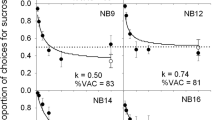Abstract
Previous research has shown that running increases as body weight decreases. One interpretation of this relationship is that motivation to run increases as body weight decreases. In the present study, the relationships among body weight, running, and responding for the opportunity to run were investigated. Fourteen male Wistar rats were trained to respond on levers. The reinforcing consequence was the opportunity to run for 60 seconds. In each session, subjects were exposed to a series of variable-interval schedules. Over sessions, body weight was increased from 80% to 100% of an initial ad-lib level and then returned to 80%. Results showed that running and lever-pressing rates were lower at the higher body weight whereas mean latency to respond following reinforcement was higher at the higher body weight. Analysis of between subjects data also revealed orderly relationships. At each body weight, lever-pressing rates were positively related to running rates. In addition, changes in running caused by change in body weight were positively related to changes in lever-pressing rates and negatively related to changes in latency. Finally, changes in running were not related to initial levels of running. In sum, the results were consistent with the interpretation that motivation to run varies with body weight.
Similar content being viewed by others
Reference
BAUMEISTER, A., HAWKINS, W. F., & CROMWELL, R. L. (1964). Need state and activity level. Psychological Bulletin, 61, 438–453.
BELKE, T. W. (1995). Running and responding reinforced by the opportunity to run: Effect of reinforcement duration. Manuscript submitted for publication.
BELKE, T. W., & HEYMAN, G. M. (1994). A matching law analysis of the reinforcing efficacy of wheel running in rats. Animal Learning & Behavior, 22, 267–274.
COLLIER, G. H. (1970). Work: A weak reinforcer. Transactions of the New York Academy of Sciences, 32, 557–576.
FLESHLER, M., & HOFFMAN, H. S. (1962). A progression for generating variable interval schedules. Journal of the Experimental Analysis of Behavior, 5, 529–530.
HERRNSTEIN, R. J. (1970). On the law of effect. Journal of the Experimental Analysis of Behavior, 13, 243–266.
HERRNSTEIN, R. J. (1974). Formal properties of the matching law. Journal of the Experimental Analysis of Behavior, 21, 159–164.
IVERSEN, I. H. (1993). Techniques for establishing schedules with wheel running as reinforcement in rats. Journal of the Experimental Analysis of Behavior, 60, 219–238.
JAKUBCZAK, L. F. (1967). Age differences in the effects of terminal food deprivation (starvation) on activity, weight loss, and survival of rats. Journal of Gerontology, 22, 421–426.
MCSWEENEY, F. K., & HINSON, J. M. (1992). Patterns of responding within sessions. Journal of the Experimental Analysis of Behavior, 58, 19–36.
MCSWEENEY, F. K., WEATHERLY, J. N., & SWINDELL, S. (1995). Within- session changes in key and lever pressing for water during several multiple variable-interval schedules. Journal of the Experimental Analysis of Behavior, 64, 75–94.
MECHNER, F., & GUEVREKIAN, L. (1962). Effects of deprivation upon counting and timing in rats. Journal of the Experimental Analysis of Behavior, 5, 463–466.
MOSKOWITZ, M. J. (1959). Running-wheel activity in the white rat as a function of combined food and water deprivation. Journal of Comparative and Physiological Psychology, 52, 621–625.
PIERCE, W. D., EPLING, W. F., & BOER, D. P. (1986). Deprivation and satiation: The interrelations between food and wheel running. Journal of the Experimental Analysis of Behavior, 46, 199–210.
PRICE, E. O. (1976). Food deprivation effects on the running-wheel activity of wild and domestic Norway rats. Behavioural Processes, 1, 191–196.
SCLAFANI, A., & RENDEL, A. (1978). Food deprivation-induced activity in dietary obese, dietary lean, and normal-weight rats. Behavioral Biology, 24, 220–228.
TREICHLER, F. R., & HALL, J. F. (1962). The relationship between deprivation weight loss and several measures of activity. Journal of Comparative and Physiological Psychology, 55, 346–349.
WALD, B. A., & CHENEY, C. D. (1975). Matching behavior and deprivation. Bulletin of the Psychonomic Society, 6, 4–6.
Author information
Authors and Affiliations
Additional information
This research was supported by Grant OGP0170022 from the Natural Sciences and Engineering Research Council of Canada.
Rights and permissions
About this article
Cite this article
Belke, T.W. The Effect of a Change in Body Weight on Running and Responding Reinforced by the Opportunity to Tun. Psychol Rec 46, 421–433 (1996). https://doi.org/10.1007/BF03395175
Published:
Issue Date:
DOI: https://doi.org/10.1007/BF03395175




